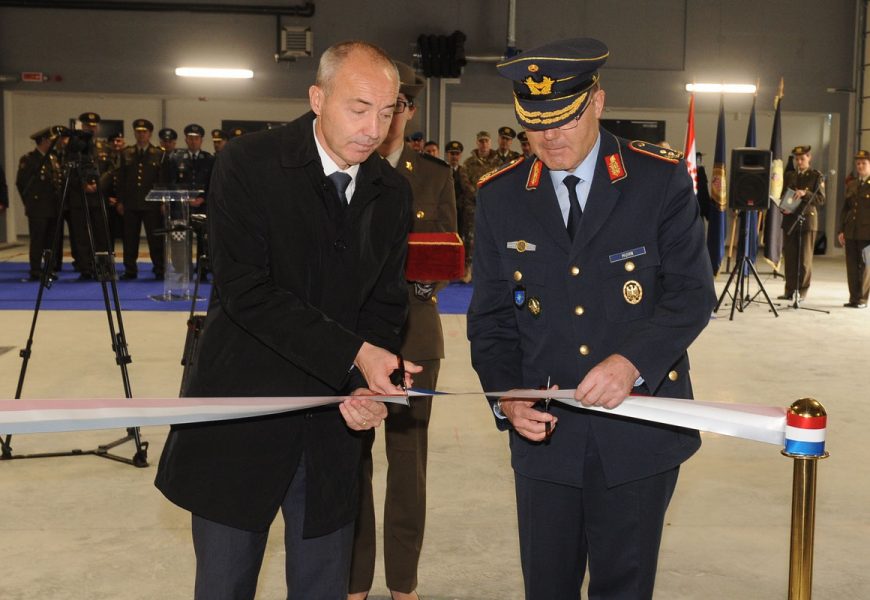NCISG facility formally opened at Pleso
The newbuilt building to house the Croatian component of NATO Communications and Information Systems Group (NCISG) was formally opened in the Barracks “Pukovnik Marko Živković” at Pleso on 7 November 2017.
The opening ceremony was attended by the Commander of NCISG, Major General Walter Huhn, alongside the Deputy Prime Minister and Defence Minister Damir Krstičević and the Director of the General Staff of the Croatian Armed Forces, Rear admiral Robert Hranj.
Minister Krstičević extended appreaciation to the MoD and the Croatian Armed Forces staff contributing to the realisation of the valuable project, as well as to NATO partners for their crucial contribution, expert and financial support to the valuable project. “I believe that our strong alliance and sincere partnership with NATO alliance will continue to build the defence capabilities of the Croatian Armed Forces; we also need to promote experience sharing and guard common values among NATO nations“, said Minister Krstičević.
The Minister also stressed that the benefit of the project exceeded its material value, providing the Croatian Armed Forces top-educated and trained members.
“You make the difference, and continuing your lifelong learning in top institutions you will also continue to contribute to the development of the victorious Croatian Armed Forces in the demanding and fast expanding domaine of CIS technologies“, told the Minister to the members of the Croatian component of the NCISG, and expressed his pride over their engagement in NATOm missions over the past years, proving themselves as a credible partner.
The Commander of the NCISG,Major General Walter Huhn stated he was pleased that the DCM building, funded by NATO, would underpin capability development of the Croatian Armed Forces. Maj.Gen. Huhn in his turn expressed appreciation to the Republic of Croatia and the Defence Minister for their participation in the project and underlined the importance of trained and educated personnel and adequate equipment, the DCM being an example.
The Director of the General Staff of the Croatian Armed Forces, Rear admiral Robert Hranj expressed appreciation to the Commander of NCISG, Major General Walter Huhn and his staff for the assistance provided during the project. The opening of the DCM facilty not only concludes the infrastructure project but is also an important milestone in years-long efforts to develop new CIS capabilities. The Croatian Armed Forces engagement in NCIS is a long-term commitment, and new capabilities and competences will enhance their contribution to NATO-led operations and missions.
“The project is of high importance for the Croatian Armed Forces. The development of CIS capabilities with the assistance and guidance of NATO experts will upgrade our expertise in the domain and train future generations of military experts who will in their turn raise the standards in the Croatian Armed Forces for the national solutions“, said RAdm Hranj.
The Commander of the DCM Company, Captain Mario Lukežić said that the new building and the equipment would facilitate the challenging and demanding daily operation of the Compamy.
Captain Lukežić presented the DCM tasks (establishment, maintenance and operation of CIS for deployed NATO commands) and underlined that the unit took part in as many as seven NATO exercises, in Resolute Support Mission in Afghanistan and in “NATO Support to Turkey” in Turkey.
The facility, stationed in the Barracks “Pukovnik Marko Živković” at Pleso and funded by NATO, will house the Croatian Deployable Communication and Information Systems Module(HRV DCM), which is assigned to the 1st Signal Battalion of the Supreme Headquarters Allied Powers Europe.
The establishment and construction project kicked off in May 2014 and entailed the execution of infrastructure works, i.e. the construction of a facility for permanent accomodation of the Croatian component of the DCM in compliance with the respective NATO norms and standards.
The works, costing 3,729 mil EUR, lasted from February 2016 until late September 2017.

